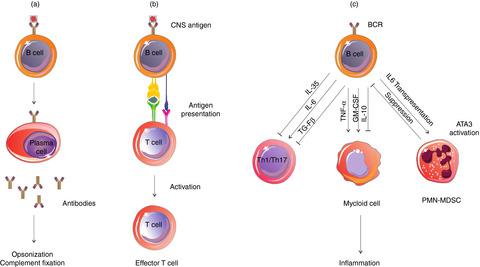当前位置:
X-MOL 学术
›
Immunology
›
论文详情
Our official English website, www.x-mol.net, welcomes your
feedback! (Note: you will need to create a separate account there.)
The role of B cells in the immunopathogenesis of multiple sclerosis.
Immunology ( IF 4.9 ) Pub Date : 2020-04-06 , DOI: 10.1111/imm.13198 Tohid Gharibi 1, 2, 3, 4, 5 , Zohreh Babaloo 1, 2 , Arezoo Hosseini 1, 2, 3, 4 , Faroogh Marofi 1, 2 , Abbas Ebrahimi-Kalan 3, 4 , Saeed Jahandideh 6 , Behzad Baradaran 1, 2
Immunology ( IF 4.9 ) Pub Date : 2020-04-06 , DOI: 10.1111/imm.13198 Tohid Gharibi 1, 2, 3, 4, 5 , Zohreh Babaloo 1, 2 , Arezoo Hosseini 1, 2, 3, 4 , Faroogh Marofi 1, 2 , Abbas Ebrahimi-Kalan 3, 4 , Saeed Jahandideh 6 , Behzad Baradaran 1, 2
Affiliation

|
There is ongoing debate on how B cells contribute to the pathogenesis of multiple sclerosis (MS). The success of B‐cell targeting therapies in MS highlighted the role of B cells, particularly the antibody‐independent functions of these cells such as antigen presentation to T cells and modulation of the function of T cells and myeloid cells by secreting pathogenic and/or protective cytokines in the central nervous system. Here, we discuss the role of different antibody‐dependent and antibody‐independent functions of B cells in MS disease activity and progression proposing new therapeutic strategies for the optimization of B‐cell targeting treatments.
中文翻译:

B细胞在多发性硬化免疫发病机制中的作用。
关于 B 细胞如何促进多发性硬化症 (MS) 的发病机制一直存在争论。B 细胞靶向疗法在 MS 中的成功突出了 B 细胞的作用,特别是这些细胞的抗体非依赖性功能,例如向 T 细胞呈递抗原以及通过分泌致病性和/或中枢神经系统中的保护性细胞因子。在这里,我们讨论了 B 细胞的不同抗体依赖性和抗体非依赖性功能在 MS 疾病活动和进展中的作用,提出了优化 B 细胞靶向治疗的新治疗策略。
更新日期:2020-04-06
中文翻译:

B细胞在多发性硬化免疫发病机制中的作用。
关于 B 细胞如何促进多发性硬化症 (MS) 的发病机制一直存在争论。B 细胞靶向疗法在 MS 中的成功突出了 B 细胞的作用,特别是这些细胞的抗体非依赖性功能,例如向 T 细胞呈递抗原以及通过分泌致病性和/或中枢神经系统中的保护性细胞因子。在这里,我们讨论了 B 细胞的不同抗体依赖性和抗体非依赖性功能在 MS 疾病活动和进展中的作用,提出了优化 B 细胞靶向治疗的新治疗策略。











































 京公网安备 11010802027423号
京公网安备 11010802027423号